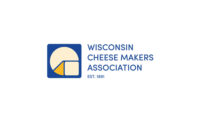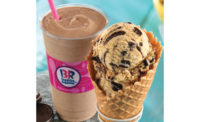
Special Order
by Julie Cook Ramirez
Contributing Editor
Contributing Editor
Artisan cheese makers respond to consumers’ desires for unique, handcrafted varieties.
When the average consumer
thinks of American cheese, visions of individually-wrapped, paper-thin,
orange-colored slices typically come to mind. Undeniably kid-friendly,
traditional “American cheese” has taken center stage on
literally billions of grilled cheese sandwiches and topped countless
burgers over the past several decades.
These days, however, American cheese has come to mean
something altogether different, unique and decidedly upscale. Hundreds of
artisan or specialty cheese makers are operating in 43 states, crafting
more than 350 varieties of American-made cheese. Thanks to their ingenuity
and careful craftsmanship, American-made cheese now rivals the
world’s finest cheeses. Some American artisan cheese makers even
report interest from European distributors. Talk about the tables being
turned!
According to Marilyn Wilkinson, director of national
product communications for the Madison-based Wisconsin Milk Marketing Board
(WMMB), several factors are contributing to the strong interest in
specialty cheese: the trend toward eating more natural, handmade foods with
a known origin, the desire for “bigger, bolder flavors” spurred
on by travel and cooking shows and the desire to eat American-made foods.
“Those factors are conspiring to give a great lift to specialty and
artisan cheeses,” she says.
Cheese maker Valerie Thomas of Winchester, Calif.-based
Winchester Cheese Co., cites other factors – most notably an innate,
often unspoken, desire to return to a simpler time, before wireless phones
and Blackberries. “The time is right for artisan cheese makers to be
successful because the general population is receptive to remembering when
things were made by hand,” Thomas says. She also cites the
“trust factor” – that is, consumers prefer being able to
pick up the phone and talk to Thomas herself about a Winchester product,
than try to call a large cheese manufacturer, where a bank of customer
service representatives will field the call.
“There’s a telephone number on the package
that you can call, but is that person going to be as concerned about my
questions as the owner of the company?” Thomas wonders.
“Probably not.”
Winchester produces a variety of gouda, Boere Kaas,
which Thomas explains means “homemade on the farm” (as opposed
to factory-made) in her family’s native country of Holland. Varieties
include Medium Aged, Super Aged, Smoked, Jalapeño, Cumin and Garden
Herb. In addition to selling its cheeses online and in its onsite store,
Winchester sells “quite a bit” of cheese to chefs.
“They generally order our more intensely-flavored
cheese because they have a budget to watch and a little will go a long
way,” she says. “A wheel of cheese will serve a lot of
customers if it’s just shaved a little bit over a salad or pasta or
served on a cheese course.”
In Lindsay, Calif., Marisa Simoes, owner of Three
Sisters Farmstead Cheese, is reveling in her company’s recent
third-place win in the farmstead cheese category at the 24th annual
American Cheese Society competition. The award-winning cheese,
“Serena,” is a custom-designed Italian-style cheese possessing
a “rich, nutty, deep, complex flavor,” Simoes explains. The
company’s other offering, “Serenita,” is said to have a
much lighter, tangier flavor with a creamier, smooth texture. Suggested
pairings include “well-flavored foods” and ripe fruits.
Staying On Top
In Wisconsin, meanwhile, Thorp-based Penterman Farm
recently rolled out Marieke Gouda, a line of authentic farmstead
Dutch-style goudas, handcrafted by owner Marieke Penterman. She moved to
Wisconsin, along with her husband and three children, from the Netherlands
in 2002. The Marieke Gouda line features a number of varieties, including
Cumin, Black Melange, Burning Nettle, Italian Herb, Mustard Yellow and
Black Pepper, in addition to traditional, unflavored gouda.
In Monroe, Wis., Maple Leaf Cheese recently added a
new variety to its line of specialty cheeses. Hand-turned and aged for 12
months, English Hollow is a said to be smooth and creamy with a sharp
flavor that makes it the perfect choice for a table cheese.
Long-time foodservice provider Sartori Foods, Plymouth,
Wis. recently embarked on a line of artisan cheeses for the specialty
retail food segment. Bellavitano, one of its first introductions, is
described as “a hard cheese with a creamy, rich flavor.”
Recognizing the growing interest in small-batch
specialty cheese, national cheese manufacturers are seeking to get in on
the act as well. Sartori’s crosstown neighbor, Sargento Foods Inc.,
recently collaborated with a select group of artisan cheese makers from
across the United States, as well as internationally, to develop a line of
“artisan blend” shredded cheeses. The line began shipping in
August.
By far, Wisconsin and California are the
country’s two biggest cheese-making states, in terms of sheer volume.
In 2005, California cheese makers passed the 2-billion-pound production
mark, while Wisconsin cheese makers produced 2.4 billion pounds. Reports
that California is about to eclipse Wisconsin doesn’t cause Wilkinson
to have too many sleepless nights, however. After all, she says, reports
have abounded for years predicting California’s supposedly pending
takeover of the cheese-making crown.
Even if Wisconsin loses the quantity race, that
shouldn’t be viewed as a sign the state is falling behind when it
comes to artisan or specialty-cheese production, according to Jeanne
Carpenter, communications director of the Dairy Business Innovation Center,
a state-sponsored organization established to spur the specialty and
artisan cheese industry. On the contrary, specialty cheese accounted for
roughly 16 percent – 387 million pounds – of Wisconsin’s
total cheese production in 2006. That makes it tops in the nation in terms
of specialty cheese production, according to the Wisconsin Department of
Agriculture, Trade and Consumer Protection.
While Vermont’s specialty-cheese production is
merely a fraction of Wisconsin’s and California’s, the number
of Vermont-based artisan cheese makers has tripled in the last 10 years. In
Cabot, Vt., Cabot Creamery Cooperative got into the artisan cheese business
with the introduction of Cabot Cloth-Bound Cheddar, a single-breed,
small-batch cheddar, which is cave-aged to produce “a buttery flavor
with caramel undertones.” According to director of marketing Jed
Davis, it is produced using the traditional old-world style of utilizing
the exterior mold to create a rind that allows the cheese to interact with
its aging environment. Davis says Cabot is pleased with the growth in
sales, which are somewhat restricted by limited capacity.
“The amount of cheese that we can age is
restricted by the size of the cave,” he says. “There’s
some talk of actually undertaking an expansion of the cellars, which
hopefully will allow us to make more available for sale, so that more
people can have the opportunity to enjoy it.”
That said, Davis points out that specialty-cheese
consumption is basically limited to “that small section of the
population that can afford to pay $20 or more for a pound of cheese.”
By definition, of course, specialty or artisan cheeses
consist of small batches of product, produced with great care. Should that
be taken to imply that there’s an arbitrary cap on future growth? Or
can artisan cheese makers enjoy growth while maintaining the integrity of
their product?
“In order to stay in business and provide cheese
for our customers, we do have to expand,” Thomas says. “As we
expand, however, the quality and care that we provide for our small batches
today must continue when we make larger batches or more frequent batches.
What makes us special cannot be lost or it won’t be us
anymore.”
Julie Cook Ramirez is a freelance journalist based in
the Chicago area.
$OMN_arttitle="Special Order";?>
$OMN_artauthor="Julie Cook Ramirez";?>
